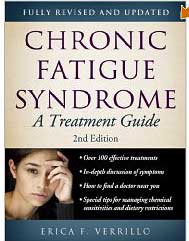



The disclaimer says “This book is not intended as a substitute for medical care.” and, of course, no book can substitute for a ‘qualified clinician’ but to put it bluntly, there’s so much information in Erica Verillo’s new chronic fatigue syndrome book it’s hard to imagine that even the most well informed doctors wouldn’t get something out of it.
This is an encyclopedia of ME/CFS theories and treatments. If it was printed out it would be fit for your coffee table. It would cost an arm and a leg to mail. The Kindle edition – it comes in an electronic form only (download a free kindle app to read it on your computer), however, downloads easily onto your computer.
This is the second edition of this book. The first, in 1998 which clocked in at a mere 432 pages, prompted Dr. Bell to write that he was “going to recommend it to every new patient he sees”.
Things only got better the second time around with three leaders in the field promoting it. Notice words like encyclopedia, comprehensive and reference book cropping up again and again.
“Verrillo’s book is an encyclopedia of current information about Chronic Fatigue Syndrome. She not only covers history and theoretical etiologies of CFS, but provides the very best source for current therapies, which is what people with CFS really want to know! This is a reference book that every patient should have. I encourage all my patients to use this as the “go-to-reference” about Chronic Fatigue Syndrome.”
~Dr. Charles Lapp, M.D., Founder, Hunter-Hopkins Center, and medical advisor to the CFIDS Association of America and the National Fibromyalgia Association.
“This book is extremely comprehensive and very well referenced, not only with regard to the full range of treatments that have been helpful, both alternative and pharmaceutical, but also including detailed descriptions of the history of this disorder, its definitions, diagnosis, symptoms, prognosis, mechanisms, and other aspects. All of this is done in a very readable style. I highly recommend this book.”
–Richard Van Konynenburg, Ph.D., Independent CFS/ME researcher
“Books such as this empower patients to take control of their own health education and management… I admire Ms. Verrillo’s comprehensive and cross-disciplinary research and feel her new work will continue to provide important and useful information to everyone interested in the field.”
– Lucinda Bateman MD, Director, Fatigue Consultation Clinic, and co-founder of OFFER (The Organization for Fatigue and Fibromyalgia Education and Research
Its Amazon.com rating is, not surprisingly, five stars
An added bonus is the writing. Erica Verillo is a published author (of the Phoenix Rising fantasy series no less :)) and she can write! Verillo obviously simply wants to get the word out as the new book is usually a ridiculously cheap $2.99 download, is free if you have Amazon prime and will be free to everybody over this weekend. It hardly seems fair :)…
- If you don’t have a Kindle simply go here to get Amazon’s free reading app and you’ll be able to read the book on your computer
Erica M. Verrillo was completing her doctorate before becoming ill with CFS in 1992. Read about her story here. I asked Erica about the book and her journey with ME/CFS.
1) After looking at the field over time what areas of research are you most excited by?
I am most excited about the recent research on gut flora (the microbiome), especially the interface between gut flora and the immune system. Kenny De Meirleir has been the driving force behind the study of gut flora in CFS/ME patients, and he is to be commended for bringing this area to the fore. There has been some spectacular research on how the status of gut flora affects not just the body’s ability to remain healthy, but how gut flora can alter the central nervous system, the endocrine system, right down to mitochondrial function. A great article was written on this topic by Grenham Sue et al. “Brain-gut-microbe communication in health and disease.” http://www.ncbi.nlm.
2) The gut hasn’t really been investigated that much in ME/CFS yet, but studies are coming, and the influence of gut microflora on disease is getting more and more attention. How important have gut problems been with your ME/CFS?
Everyone with CFS/ME has a “weak spot.” By that, I mean that patients will be most affected in the areas that have suffered the greatest prior injury – even if those injuries, or illnesses, have not been given much attention. We always take our histories with us. My history has been in the gut – typhoid, amoebiasis, giardiasis, and numerous lengthy courses of antibiotics – so that is where I experience the greatest impairment. Currently, I am able to digest only two foods: plain white rice and chicken breast. It gets boring after a few years.
Jay Goldstein was way ahead of his time. His limbic hypothesis was an accurate account of how homeostasis is disrupted by CFS/ME. I still believe that damage to this very fragile part of our CNS is what produces the sympathetic dysregulation that characterizes this illness in both its acute and chronic stages. On a very basic level, CFS/ME manifests itself as a form of dysautonomia, and Jay Goldstein said it first. Unfortunately, his book is almost impossible to read, which is why the companion volume was written. That being said, researchers need to go back and re-read Goldstein’s book. Otherwise, they are just reinventing the wheel.
Researchers also need to go back and read everything Dr. Paul Cheney said about immune system dysregulation in patients with CFS/ME. In the late 1980s, Cheney said that CFIDS was an immune disease, and everyone, at that time, accepted that premise. Then it got lost, or rather, buried, under an avalanche of studies that somehow proved there was no “consistent” immune defect in people with CFS/ME.The immune system is a moving target; it is constantly changing to respond to both the inner and outer environment. Looking for an immune defect in a single blood draw is like trying to visually track the flight of a mosquito at fifty paces. The recent Ekua Brenu longitudinal study lays the entire “inconsistency” argument to rest. Over a 12-month period, Brenu’s group found a consistent reduction in NK cell cytotoxicity. A number of other studies have also suggested that, at least in the chronic stage, CFS/ME is autoimmune. Again, Cheney pointed out that a genetic “adjustment” is the third (chronic) stage of the illness. This “adjustment” at the genetic level is autoimmunity.4) This is a very big book. How do you recommend that people use it?
The book is an encyclopedia, which means people should read it piecemeal. Otherwise it will be overwhelming. Pick whatever treatment, or symptom, you like, and read just that section. The book is designed for people with cognitive problems, so readers will not miss anything if they read it in little bits. (I may be the only person who has actually read the whole thing.) Each section is fairly short, and information is repeated, which means readers don’t have to retain a lot of complex information in order to understand a different section.
Anybody anywhere can use this book (even though treatment costs are in US dollars). I’ve posted one entire section, Supplements, on my blog for people who do not read English. (There is a translate button.) The entire first edition of the book is also on my blog, and can be translated into any language. Knowing how few treatment books exist for people with CFS/ME, I don’t want anybody to miss having this tool. http://cfstreatment.








This is the reason I began the Digestive Enzyme protocol a couple of weeks ago. I suggest the http://www.enzymestuff.com site. It’s not just about food digestion!
The Enterologists don’t make money in this arena, so, they’re not interested. No money……we go it alone!
RP
Love to hear about more gut resources Richard. We’re going to be focusing more on the gut over the next couple of weeks on Health Rising.
Hi,
I can’t read on a computer screen and do not have a Kindle. Will this second edition book be published in print?
Thanks!
Linda
My guess is not…This is a huge book and my guess is that paper format is just not viable but Erica would know better. Have you ever tried to hook up your computer to your TV? I wonder if that would work better?
Is there going to be an e-pub version of this? It’s really frustrating to have to deal with a corporation using a proprietary format to enforce a monopoly like Amazon.
It absolutely is. I am reading it now so I can do a review. It will be a great one.
Lindsay, you can download the Kindle app to your computer. You don’t have to have a Kindle to read Kindle books. ;=}
Thanks Cort, got it!
This is a wonderful offer, but seems restricted in some places outside the US. I’m in South Africa. I’ve tried the link several times since the post arrived, but the price remains a stubborn $5.99. Anything to be done?
The offer was available for download direct to a kindle. It looks a great book, both for the information it contains and for all the references it gives should one want to follow up anything in more detail. Thanks!
Book offer by Verillo only available at amazon.com not at Amazon.co.uk!
Not being as computer savvy as I need to be-I find this book not being available on paper ridiculous. I like something I can carry around and do not use a laptop. I cannot sit in front of the computer and read this. I copy off most of the info from your site on my printer now and keep in a file. I also can use for referral when I need it. I do use Amazon. However don’t understand
why I would have to go that way. Is it going to be available anytime on paper-or where we can copy from computer???
San Diego
I just read in the book a bit this week and I LOVE it. It is such an incredibly generous act from Erica Verrillo to put all that hard work into the book and sell it at a super affordable price.
I just read the section on the Amygdala Retraining Program and I found everything I wanted to know. A concise description of the program and then hyperlinks to well-written, in-depth websites for learning more about it.
Thank you Erica for providing this great resource!
That’s what’s so great about the book…Erica covers, I don’t want to say everything (although it might be true) and she covers it even-handedly..
I was happy to see eliminating salicylates and nightshades mentioned. Email me at bhtnc@hotmail.com or google FAILSAFE/RPAH for more info.
I have found so much useful information about CFS/ME in just a few minutes of reading the book. This really a god send for all those in the battle with CFS/ME. I can’t thank you enough for the hard work you hard work you have obviously put into this book. I have had CFIDS for a little over two years now and get so frustrated when I don’t know what is going on with my body. This book will help so much. Thank you.
A very special THANK YOU to you Cort, + the Author (Erica) for making this available (for free!!!!!)
This is an amazing gift + we are most grateful!